48+ Sample Dismissal Letters
-
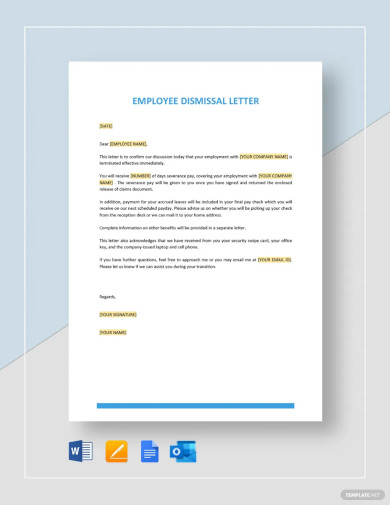
Employee Dismissal Letter Template
download now -
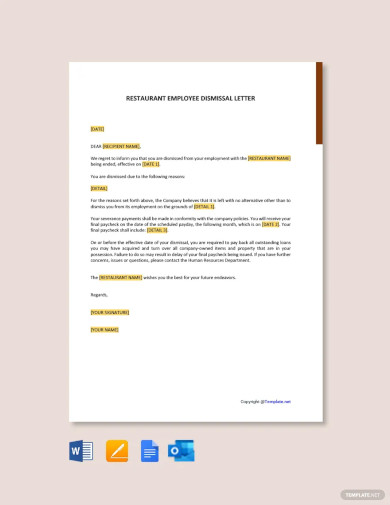
Free Restaurant Employee Dismissal Letter Template
download now -
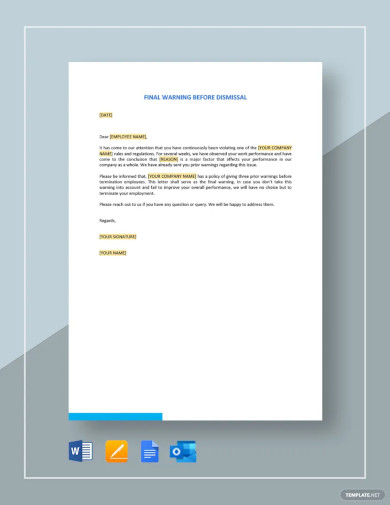
Final Warning Before Dismissal Template
download now -

Standard Employee Dismissal Letter Template
download now -
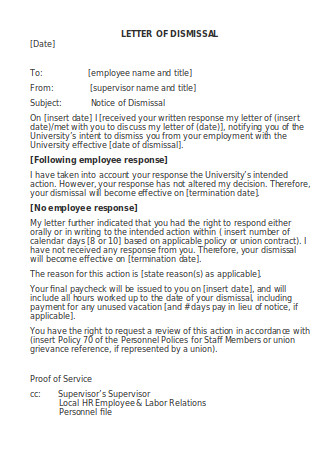
Sample Letter of Dismissal
download now -
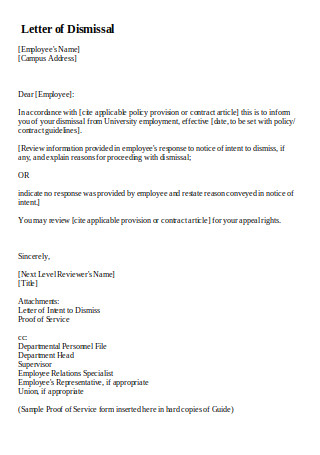
Letter of Dismissal
download now -
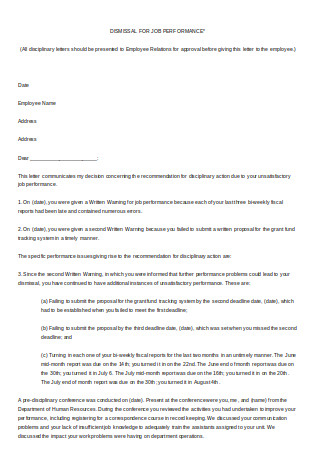
Dismissal for Job Performance
download now -
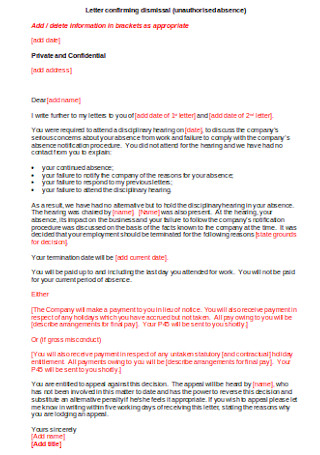
Letter Confirming Dismissal
download now -
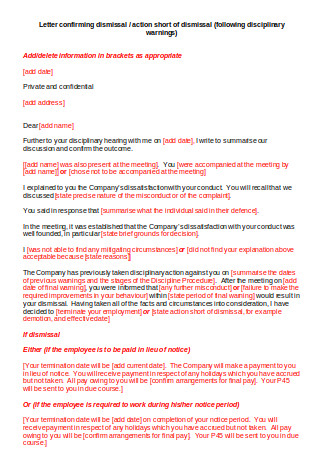
Action Short of Dismissal Letter
download now -
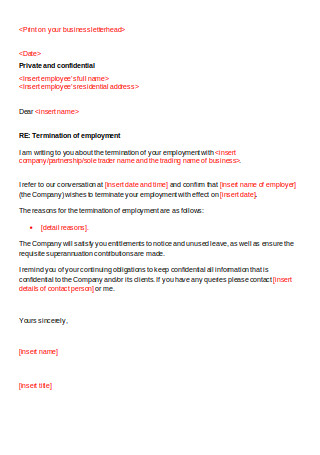
Termination Letter
download now -
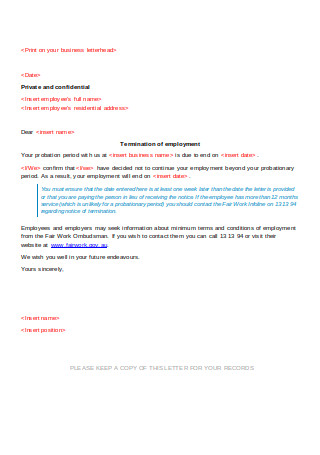
Unsuccessful Probation Letter
download now -
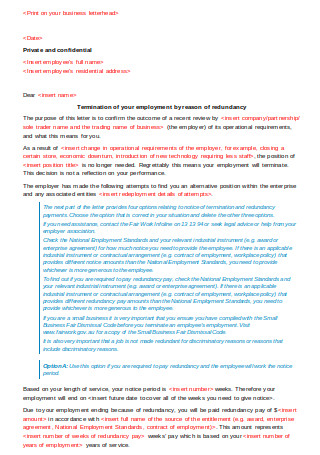
Letter of Termination of Employment
download now -
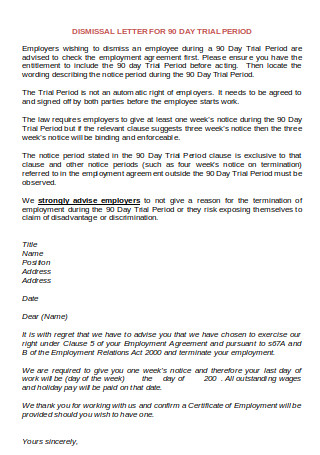
Dismissal Letter for 90 Day Trial Period
download now -
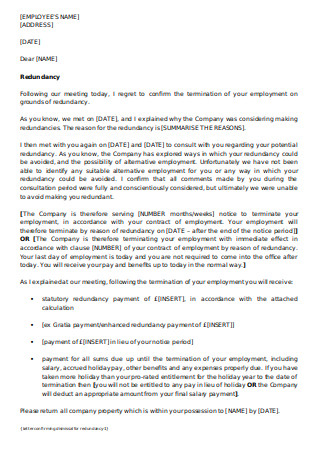
Letter Confirming Dismissal for Redundancy
download now -
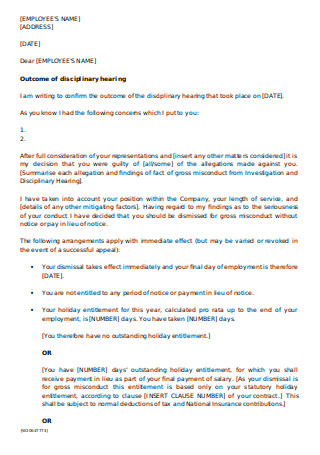
Disciplinary Dismissal Letter
download now -
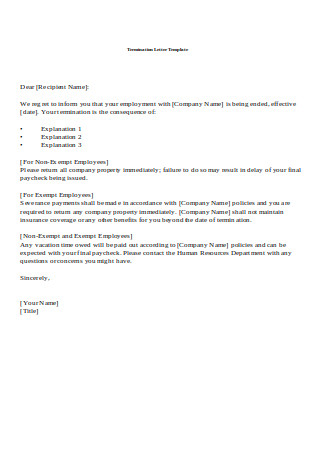
Employee Termination Letter Template
download now -
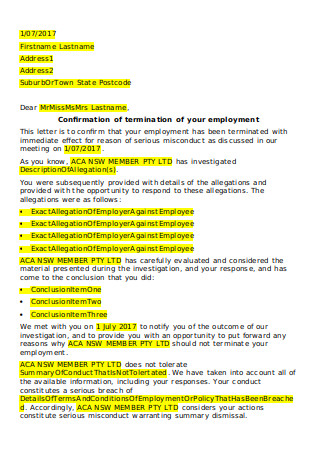
Summary Dismissal Letter
download now -
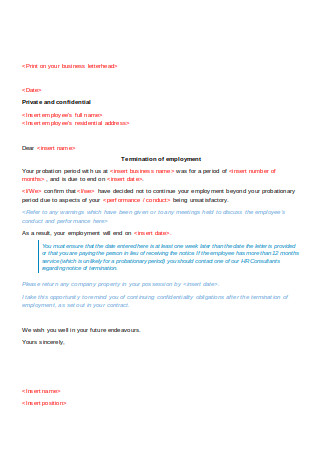
Sample Unsuccessful Probation Letter
download now -
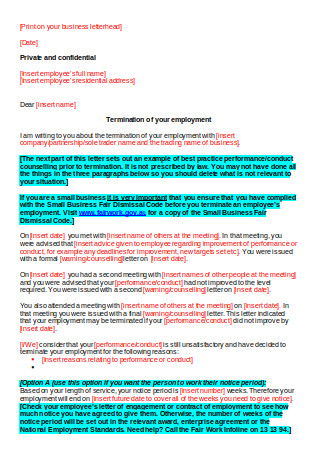
Letter of Termination Employment
download now -
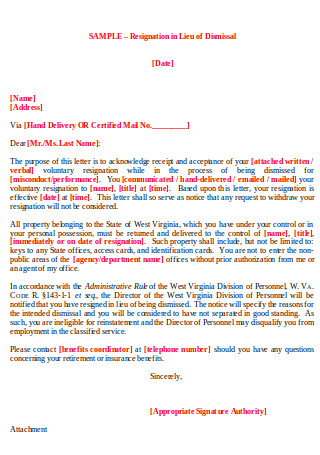
Resignation in Lieu of Dismissal Letter
download now -
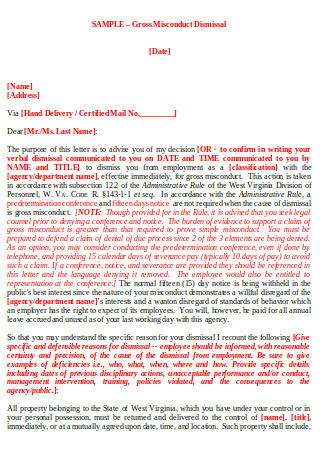
Misconduct Dismissal Letter
download now -
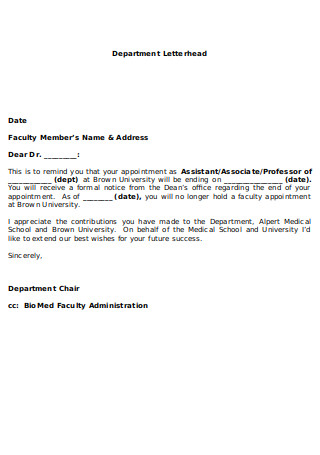
Formal Letter of Dismissal
download now -
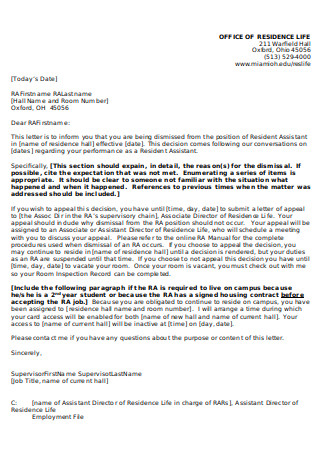
Sample RA Dismissal Letter
download now -
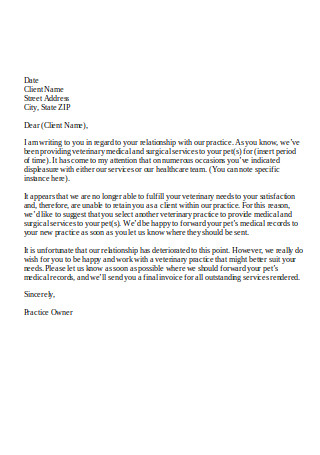
Sample Client Termination Letter
download now -
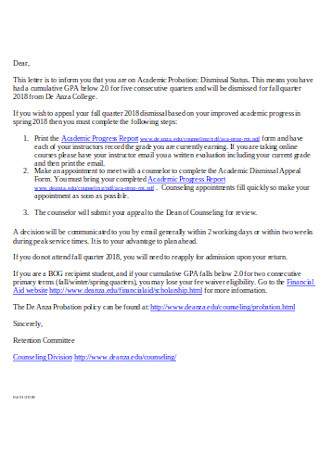
Dismissal Letter to Students
download now -
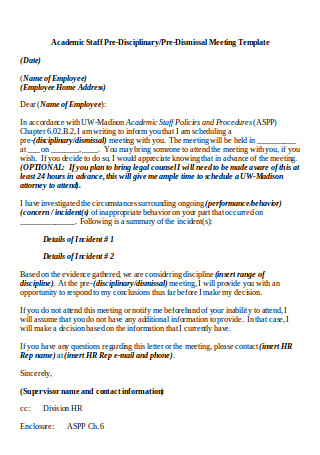
Pre-Dismissal Meeting Template
download now -
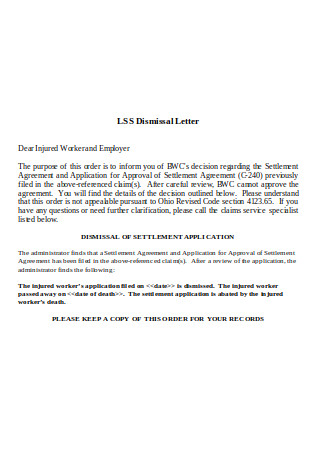
LSS Dismissal Letter
download now -
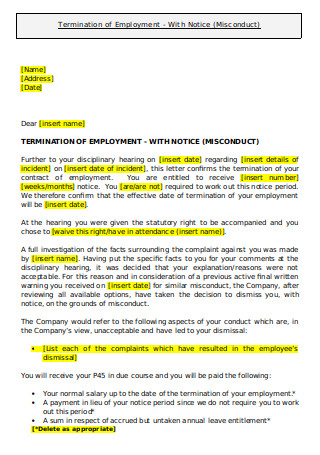
Termination of Employment with Notice
download now -
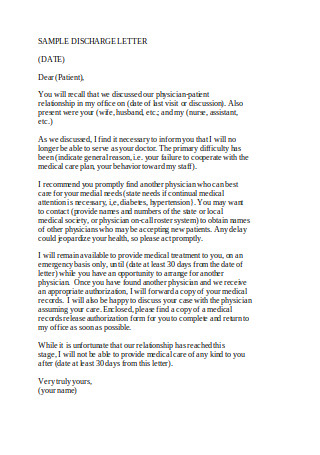
Sample Discharge Letter
download now -
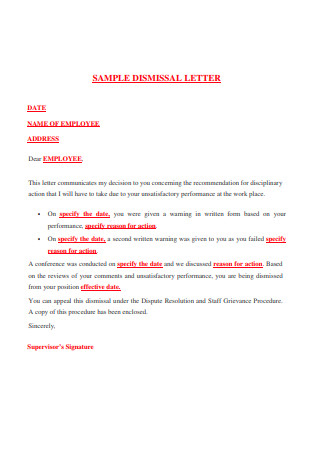
Sample Dismissal Letter
download now -
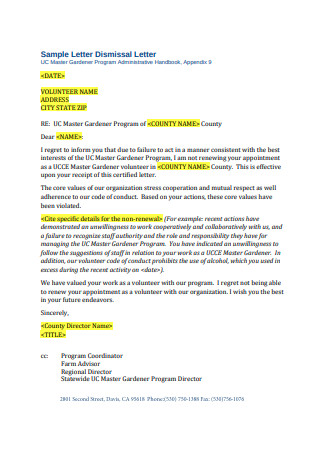
Letter of Dismissal Sample
download now -
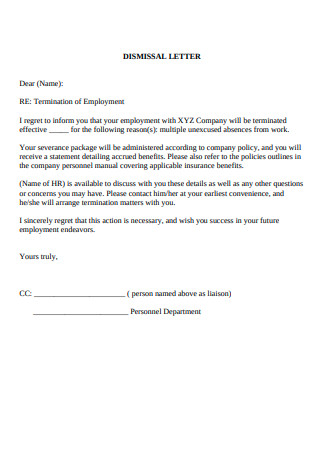
Dismissal Letter in PDF
download now -
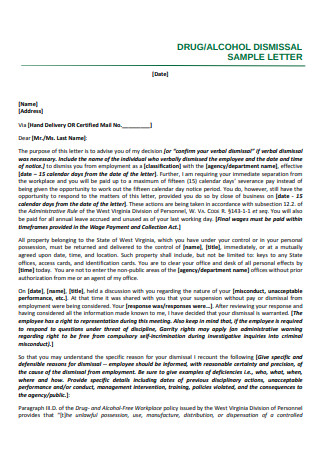
Sample Alcohol Dismissal Letter
download now -
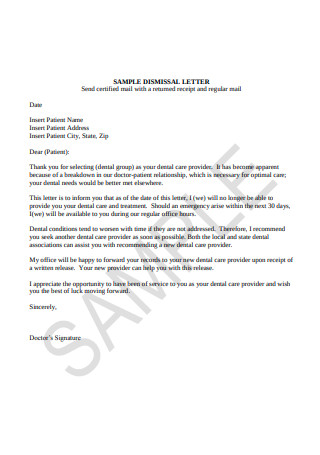
Sample Dismissal Letter in PDF
download now -
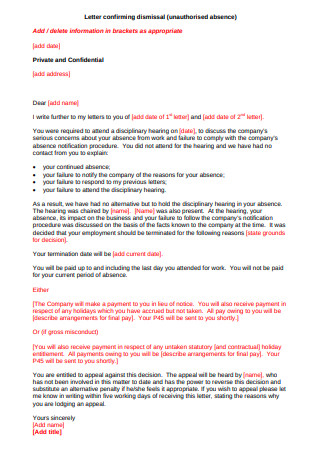
Sample Letter Confirming Dismissal
download now -
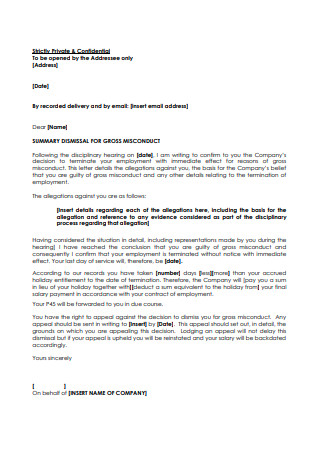
Confirmation of Dismissal for Misconduct
download now -
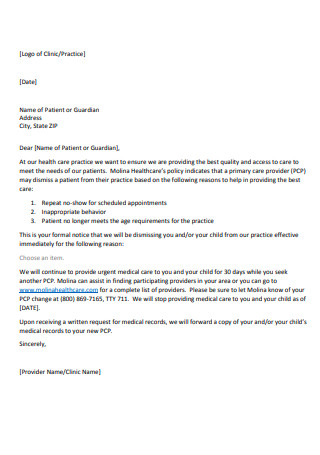
Dismissal Letter Draft
download now -
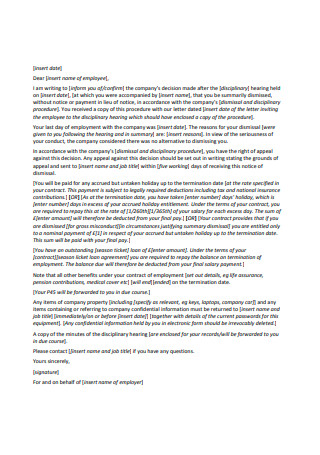
Sample Letter of Summary Dismissal
download now -
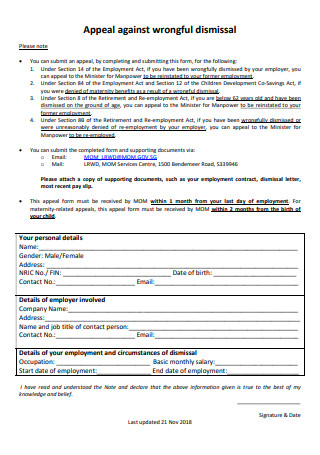
Appeal Against Wrongful Dismissal
download now -
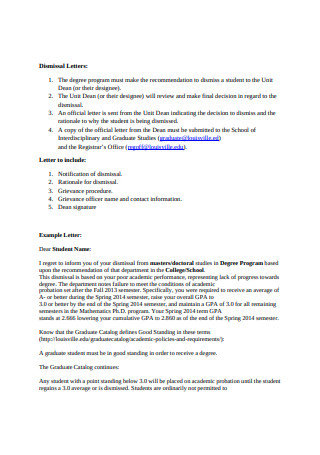
Student Dismissal Letter Sample
download now -
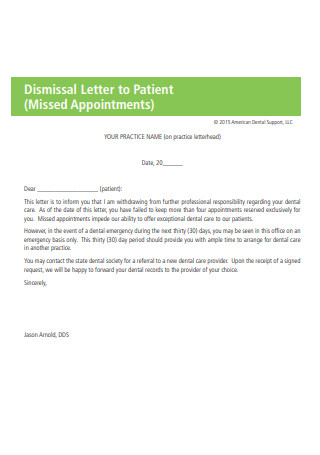
Dismissal Letter to Patient
download now -
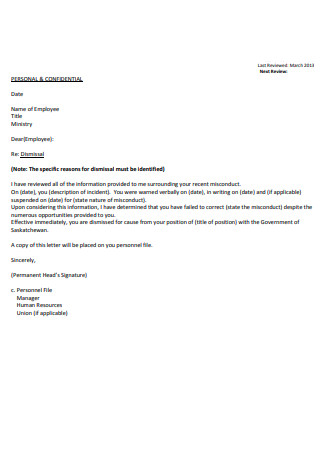
Samples Letter of Dismissal for Cause
download now -
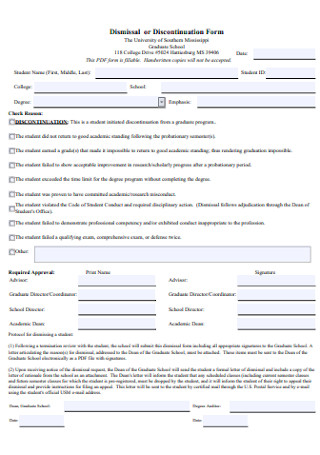
Dismissal or Discontinuation Form
download now -
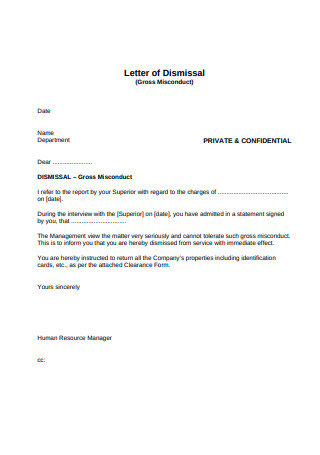
Letter of Dismissal for Gross Misconduct
download now -
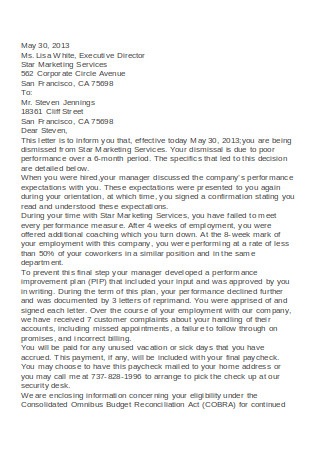
Letter of Dismissal in Word
download now
What is a Dismissal Letter?
A dismissal or termination letter is a document sent to an employee, notifying him that the employer wishes to end his contract. You can send a notice for multiple reasons: cost-cutting or downsizing, poor performance, or gross misconduct. Most American employees are “at-will employees.” When an employee is “at-will,” the employer can choose to terminate him at any given time for any reason–except for age, race, color, gender, religion, ethnicity, medical history/disability, veteran status, and retaliation–with or without notice. However, if an employee is unionized (has a union contract), the employer is required to submit a notice of termination. For mass terminations or lays-off, the company or employer needs to give a 60-day notice of termination or dismissal letters to the affected employees. Any unlawful or wrongful dismissal is subject to legal action. That’s why you have to draft a dismissal letter correctly to protect yourself, the employer, from sanctions or violations.
There are two types of termination: voluntary and involuntary. Voluntary termination is when an employee chooses to leave the company for personal reasons–to pursue another career opportunity, to focus on the family, to move to a different residence. It’s commonly known as “resignation,” and the employee is required to give “two weeks notice” before resigning. Involuntary termination is when a company decides to let go of an employee. It’s more commonly known as the “pink slip.” Unless the employee has a contract with a union, the employer can choose not to disclose the reason for termination, or even send a termination letter. Wrongful termination is when an employee is fired purely because of one’s race, gender, sexual orientation, political belief, religion, ethnicity, and medical history. According to nolo.com, a wrongful termination settlement claim can range anywhere between $5,000 to $40,000, but it can increase depending on the gravity of the violation.
Four Famous Cases of Wrongful Termination
No matter how big a company or franchise is, no one will be able to escape from the court of law for any violation, especially wrongful termination. Here are five examples where employees were allegedly unlawfully terminated:
Mayra Rodriguez, a former employee of Planned Parenthood, had accused a doctor of allegedly endangering the lives of their patients and falsifying records. The case ended with Rodriguez taking home $3M in a wrongful termination settlement. She was reportedly let go as retaliation for whistleblowing.
Jeannette Ortiz vs. Chipotle
Livelihood Law details the reason for the unlawful termination of Jeannette Ortiz, a former manager at Chipotle. Accused of stealing $636 from the cashier, the reason she got dismissed was that she allowed a former employee to take pregnancy leaves and compensation claims. She was awarded $8 million as a settlement.
Four Women vs. Nike
This was an ongoing case of wrongful termination due to gender discrimination. Allegedly, the four women who filed the lawsuit received lesser bonuses, lesser pay, and did not receive promotions compared to their male employees.
Harold Carter vs. FedEx
FedEx was ordered to pay $5.3 million after terminating Harold Carter allegedly due to his medical condition. Harold Carter suffered an injury to his spinal column after a box had fallen over his head and got hospitalized. Since he could no longer lift more than 10 pounds, FedEx allegedly fired him with reasons, according to harriskaufman.com, saying he already had three disciplinary write-ups. This was a classic example of wrongful termination due to medical history.
Wrongful termination letter is a case that the court of law takes seriously, and therefore, should be avoided as much as possible.
What Are Other Uses of a Dismissal Letter?
Though most of us think that a termination letter can only be applied when firing an employee, there are also other uses for it. You can also use it for schools, hospitals or clinics, or even business contracts.
A Guide in Drafting a Dismissal Letter
It can be hard to put your thoughts on paper, especially when it bears bad news. As much as we want to retain employees, if the company is already suffering due to an employee’s poor performance, or the employee has done grave misconduct, we don’t have a choice but to hand down the verdict of termination. You can download our dismissal letter templates to make it easier for you. You can also refer to this guide for what to put in a dismissal letter. What do you usually find in a notice of termination?
Since a dismissal letter can prove as a legal document protecting an employer for possible lawsuits, you have to state the reason why you dismissed an employee. It can range from performance to downsizing. Include some supporting statements for your reason and the previous warning that was issued. You also have to state possible payroll deductions on the final paycheck and the date that it will be issued. Depending on your company policy, your employee will receive severance pay. Due to the Consolidated Omnibus Budget Reconciliation Act (COBRA), some employees may continue to receive insurance benefits 60 days after resignation or termination.
Make sure to include that in the letter. Since the employee is no longer works for your company, he has to surrender any item that belongs to the company (e.g., company badge, company cellphone, company car). He may also need to get his Certificate of Employment and W-4 form from you. You also need to specify the effectivity date of the termination. It specifies when you want to end the contract of the terminated employee, and will give him time to prepare for the hunt for a new employer fully. It’s important to provide an equal platform to all your employees. Though the employee has committed grave misconduct, we don’t want that talent to go to waste by putting it back into the market only to be hired by a competitor. Therefore, indicate that they have a chance to turn your decision over through an appeal.
Your dismissal letter needs to be as specific and detailed as possible while still concise to avoid fines or lawsuits.
Three Things to Think of Before Terminating an Employee
Letting go of an employee is a decision you have to think through thoroughly. Though it may be a relief to you, as an employer, to dismiss a bad employee, you don’t want to end up regretting your decision later. Take a look at the things below before rushing that termination.
Check your Code of Conduct
Every company needs to have one. It guides you on what decisions to make based on the gravity of the misconduct. Other violations require corrective actions first before suspension or termination. Others jump automatically to the termination. This may be used against you as grounds for unlawful termination if not followed.
Secure Your Letters of Misconduct
Misconduct warning letters are the documentation provided to your employees as a warning of the consequences of their actions. If your code of conduct merits a notice to explain, make sure to secure the documentation along with the affixed signature of the violating employee. If they have already exhausted all corrective actions required, you will need those documents to protect you from lawsuits.
Conduct a Trial/Investigation
Though an employee is on his last straw, everybody deserves a chance to defend themselves. Others may be able to explain themselves better verbally rather than in writing. Remember that training and acquisition take time and money. Therefore, make sure to provide an equal platform for your employees to defend themselves, both in verbal and written communication.
Take time to consider the process of termination first – and the risks you are exposing you and your business to – before considering termination.
These are only a few examples of when a dismissal letter can be used aside from the termination of an employment contract. There may also be other circumstances that call for a dismissal letter. The key takeaway here is the use of a termination letter is when you wish to end a contract with or of another party.
How to Draft a Good Dismissal Letter (Without Currying Their Wrath)
Dismissing an employee is never easy nor comfortable. Whether you are ending an employment contract or artist contract, it’s challenging to make an emotional cushion that will survive a piece of bad news. It’s hard to tell a person upfront that you are terminating their contract, especially when they start breaking into tears. That’s why dismissal letters exist. Termination letters are also necessary for legal purposes. Like what we have stressed in this article, always secure your documentation. So to help you break the news gently, here are some tips for you on how to a good dismissal letter that won’t sting that much.
Step 1. Be Polite
Since you are going to sever your employee’s source of livelihood, you can only imagine the anger or misery that they will feel once they read your letter. You don’t want to sound blunt or rude, as this might instigate a lawsuit. Though you have enough documentation, it will still be damaging to your image (and resources).
Step 2. Use Simple Language
Wordy sentences often lose the meaning of your message. Complicated words would only make a document difficult to understand. You want to make yourself clear as much as possible. Anything in your letter can be used against you in the court of law. Avoid using complicated words that can only confuse your reader.
Step 3. Include Relevant Events That Influenced Your Decision
We all need a reason for something–an explanation of events. If something terrible happens to you, you question the actions that lead to it. Since you want to be clear that you have given your employee enough chance to redeem himself, state essential times and dates that they have previously committed gross misconduct, and the given corrective action. Make sure you also have documents to support this claim.
There are reasons why you want to take proper measures in drafting your dismissal letter. First, you want to make sure your employee does not resort to legal action. Second, you want to make sure your employee does not provide lousy feedback against your business. These days, submitting and reviewing feedback is already easy with the existence of technology. So be sure to let them down easy.
